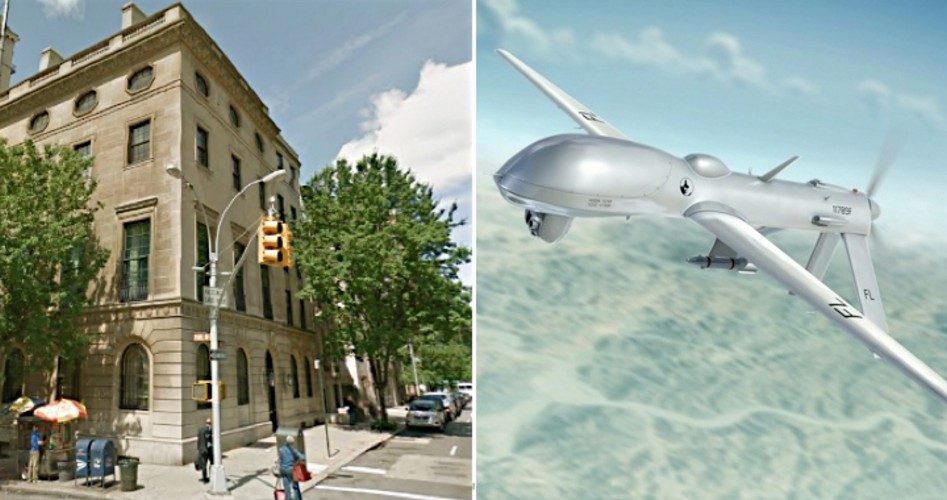
Many Americans are justifiably anxious about drone use by the federal government against the American people, but the New York-based Council on Foreign Relations says that concerns about citizen privacy are overblown. “While many are understandably anxious about the seemingly inevitable expansion of drones across the United States, I argue that many fears are either overblown or based on misperceptions,” wrote Micah Zenko on the Council on Foreign Relations website June 21.
Zenko counsels that fears about armed drones in the United States are meritless: “Although variants of the Predator can be equipped to missiles, CBP drones will not bomb U.S. citizens.” Although there are already some 64 Department of Defense drone bases located within the continental United States, there haven’t yet been any cases of attacks within the United States. But like the Bush administration that preceded it, the Obama administration has classified the “war on terror” as a global war that includes land within the territorial United States. Moreover, some local police forces have already taken steps to arm their drones with non-lethal weapons — such as tear gas and stun weapons — for crowd control.
Zenko points the finger away from drones as a cause for fear. “Of greater concern are mobile Blackhawks, which are vastly more capable than their Predator cousins.” Zenko wrote in a related article in Foreign Policy magazine. “Surveillance drones offer the CBP a number of advantages over manned aircraft, such as longer mission duration over remote areas, while providing near real-time imagery via video cameras and thermal infrared and synthetic aperture radars.” But drones also don’t have the on-the-scene personal decision-making ability that a live pilot has. Moreover, for a drone “pilot,” there’s more of a sense of playing a video game than using real violence.
The emergence of drones flying over the United States and invading the American people’s privacy has led some legislators to introduce bills to limit their flights to the text of the Fourth Amendment of the U.S. Constitution. Senator Rand Paul (R-Ky.) exclaimed of his Preserving Freedom from Unwarranted Surveillance Act of 2012 (S. 3287) introduced this month: “When I have friends over for a barbecue, the government drone is not on the invitation list. I do not want a drone monitoring where I go, what I do and for how long I do whatever it is that I’m doing. ”
Paul says that drones are just tools that law enforcement officials should use within the context of the U.S. Constitution, noting in a CNN op-ed June 14 that “like other tools used to collect information in law enforcement, a warrant needs to be issued to use drones domestically. The police force should have the power to collect intelligence; however, I believe they must go through a judge and request a warrant to do so. The judicial branch must have some authority over drones, as they do with other law enforcement tools.”
Paul’s bill does not quite raise the bar on the use of drones to the level of the Fourth Amendment to the U.S. Constitution, however. Section four of the bill allows warrantless surveillance along the borders (which is constitutional if done at the actual border) and:
EXIGENT CIRCUMSTANCES — The use of a drone by a law enforcement party when exigent circumstances exist. For the purposes of this paragraph, exigent circumstances exist when the law enforcement party possesses reasonable suspicion that under particular circumstances, swift action to prevent imminent danger to life is necessary….
HIGH RISK — The use of a drone to counter a high risk of a terrorist attack by a specific individual or organization, when the Secretary of Homeland Security determines credible intelligence indicates there is such a risk.
The Fourth Amendment standard for the use of a government search requires not just “reasonable suspicion” or the assent of a government bureaucrat, but both “probable cause” and a warrant from a court.
In limiting the use of spy drones against the American people, Senator Paul evidently has broad public support. According to a Monmouth University poll released June 12, “An overwhelming majority of Americans support the idea of using drones to help with search and rescue missions (80%). Two-thirds of the public also support using drones to track down runaway criminals (67%) and control illegal immigration on the nation’s border (64%). One area where Americans say that drones should not be used, though, is to issue speeding tickets. Only 23% support using drones for this routine police activity while a large majority of 67% oppose the idea.”
“Americans clearly support using drone technology in special circumstances, but they are a bit leery of more routine use by local law enforcement agencies,” Patrick Murray, director of the New Jersey-based Monmouth University Polling Institute, concluded of the results.
Photos: CFR headquarters at 58 East 68th Street in New York, left; Unmanned air (UAV) spy above enemy territory via Shutterstock



